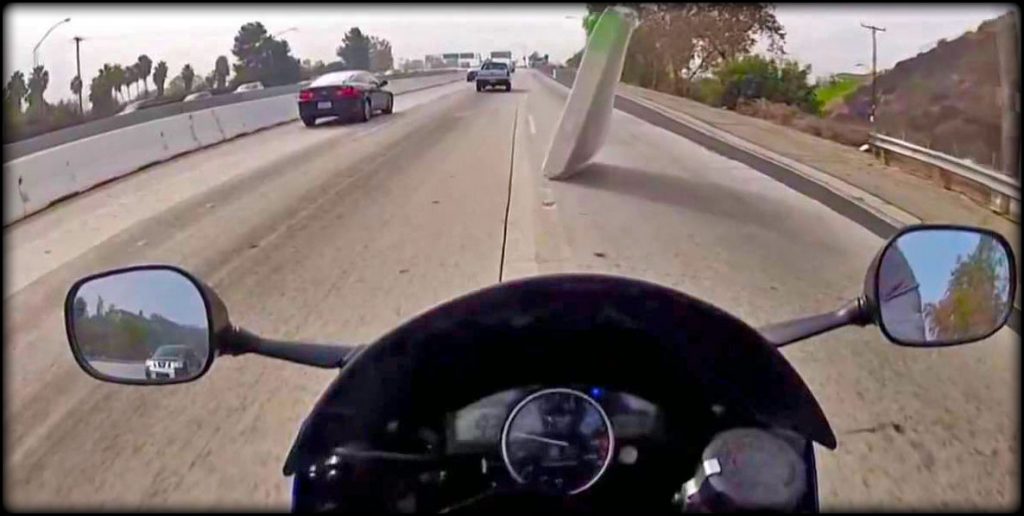RIDING TIP: Close Call Reflections
Last Updated: February 5th, 2021

MOTORCYCLE RIDING: REFLECTING ON CLOSE CALLS
No, your eyes do not deceive you. The rider in the above picture is being confronted with a mattress at highway speeds. Sooner or later we’re all there in a similar situation. The moment that causes us to become tense and fearful because we perceive something is happening that we think should not be happening. In this case, we know the rider made it past the mattress safely. Is there anything to learn from that close call?
BEING ACCOUNTABLE AND ACCEPTING RESPONSIBILITY
RiderCoaches are indoctrinated with the idea that ALL motorcycle crashes are avoidable. This places a heavy burden on us as riders. It means we have to be accountable for anything that happens while we’re riding. We come to understand all crashes are a result of multiple factors coming together to create a high risk situation that would have been well within our control if we would have only chosen to reduce our risk factors well before a crash occurs. Does it mean 100% of crashes are unavoidable? No. What it means is that we are accepting 100% the responsibility for our decision-making, attitude, and behavior while on two wheels. Close calls are an indicator that we may be introducing more risk into our riding and are a call to review what we’re doing.
This can be difficult for riders to accept. At events and in the classroom we consistently hear:
- It’s the drivers that aren’t paying attention that cause the problems
- Most crashes are the drivers fault (not true, roughly 50/50)
- I had to lay it down cuz (insert road surface fault, sun was in my eyes excuse, or wardrobe malfunction)
If we accept the notion that we are solely responsible for our crashes-all RiderCoaches sign a statement acknowledging they’re being held to a higher standard- then maybe we have the right mindset and can learn as much from the close calls than we can from actual crashes. We can’t improve and learn if we won’t do the hard work of analyzing our behavior and factors that created the close call.
WHAT WE CAN LEARN FROM CLOSE CALLS

The Motorcycle Safety Foundation (MSF) partnered with the Virginia Tech Transportation Institute (VTTI) to develop a method for analyzing motorcyclist behavior. They called the project the 100 Study. Essentially one hundred (100) motorcycle riders (ended up being more than that) allowed VTTI to place five cameras and data-logging equipment on their motorcycles. Collectively, the participating riders put 366,667 miles on their motorcycles. The video and data gathered were then analyzed.
We actually sat down with a VTTI engineer at the most recent national rider training conference. He explained that they are gleaning a ton of information not just from the thirty (30) crashes that occurred during the study, but also from the 122 near-crash events.
Interestingly, he was surprised by how little time the riders spent trying to understand the choices and behaviors that led to the near-crash events. He seems to think that if riders took more time to understand why the near-crash events happened, they’d perform much better in the future.
We’re inclined to agree with the engineer from VTTI. We think the riders may learn the following:
- Vision Could Be Used Differently
- Time and Space Management Could Have Been Better
- Risk Factors Were Improperly Identified/Managed
Interestingly enough, we cover all of these topics in our Basic RiderCourse, Confident RiderCourse, and Advanced Riding Techniques courses. So will you join us by reflecting on your close calls? Are you willing to accept responsibility for your riding behavior? Are you willing to explore ways to reduce your risks to ride safer and with more confidence? Then make 2017 the year you come play with us at TEAM Arizona. Your future self will thank you for it.
For the Entire TEAM Arizona Newsletter Content, CLICK HERE
 Bill Seltzer has been a Motorcycle Safety Foundation RiderCoach since 2003 and a Total Control Advanced Riding Instructor since 2011. He currently serves as the Marketing Director for TEAM Arizona and is a member of the Arizona Strategic Highway Safety Planning committee. Have questions or comments about the article? Email him: Bill@MotorcycleTraining.com
Bill Seltzer has been a Motorcycle Safety Foundation RiderCoach since 2003 and a Total Control Advanced Riding Instructor since 2011. He currently serves as the Marketing Director for TEAM Arizona and is a member of the Arizona Strategic Highway Safety Planning committee. Have questions or comments about the article? Email him: Bill@MotorcycleTraining.com

